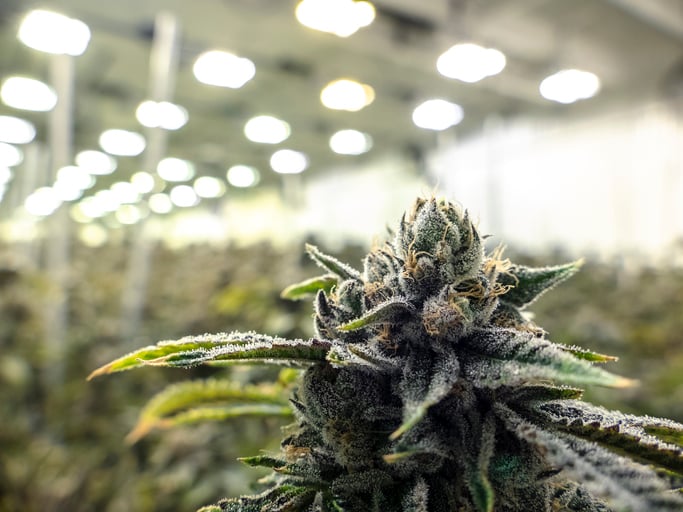For years, the marijuana industry has been all the buzz on Wall Street. That's because legal weed could become an industry that generates $100 billion, or perhaps even $200 billion, in annual worldwide sales in a decade, according to various Wall Street forecasts.
But at the center of all this is the largest marijuana stock in the world, and the only cannabis stock to currently boast a large-cap valuation: Canopy Growth (CGC +0.00%).

Image source: Getty Images.
It's no secret: Investors really like Canopy Growth
There is no shortage of reason Wall Street and investors have placed Canopy Growth on a pedestal above its peers.
For starters, there's its war chest of cash, which stood at just over $3.4 billion at the end of the fiscal fourth quarter (March 31). This accounts for more than a quarter of Canopy's current market cap, and derives from the $4 billion cash injection it received from Corona and Modelo brewer Constellation Brands (STZ +3.67%), which closed in November. Constellation holds about a 37% stake in Canopy, and has the potential to boost its ownership to as much as 56% if warrants and convertible notes it holds are exercised.
Canopy Growth also looks to dominate domestic markets, with more than 70,000 kilos of annual supply deals across all of Canada's provinces. It's currently one of four growers to have deals in all of Canada. Also, it should slide in as the No. 2 producer in our neighbor to the north, with more than 500,000 kilos of annual output when at full capacity. Aurora Cannabis' (ACB 7.63%) more than 660,000 kilos look to be the only number ahead of Canopy.
This is also a company with a strong presence in international markets. Although it, again, trails Aurora Cannabis, which has a presence in 25 countries, Canopy Growth has a production, export, or research presence in 16 countries. These overseas markets could come in particularly handy if and when domestic oversupply becomes a problem in Canada.
Canopy Growth's premium could disappear
But in spite of its advantages, Canopy Growth has a number of problems, too. In fact, I'd say that its problems should offset much of the premium currently bestowed on the company. Here are five serious concerns that you might be overlooking with Canopy Growth.

Image source: Getty Images.
1. It's highly levered to a supply-constrained market
The first thing to realize about Canopy Growth is that it's predominantly focused on gaining recreational market share. Although adult-use consumers are less likely than medical pot patients to buy high-margin derivative products -- new forms of derivatives will launch in Canada by mid-December-- the consumer pool for recreational marijuana is much larger than medical cannabis. This sounds like a good thing, until you realize that much of the supply constraints in Canada have to do with supplying adult-use marijuana.
For its part, regulatory agency Health Canada recently announced changes to its license application policy that'll likely help it reduce some of its enormous backlog. Nevertheless, fixes to Canada's supply problems aren't going to occur overnight. In fact, they probably won't even be in place by the time derivative products (like vapes, edibles, and nonalcoholic infused beverages) begin hitting shelves in less than five months. That means there's a strong likelihood of constrained sales potential for Canopy extending into 2020, and perhaps even 2021.
2. Canopy is losing money rapidly
Building on the first point, earnings actually matter now; and what Canopy Growth has delivered in operating results has been downright abysmal. The company's fiscal fourth-quarter results produced a small sequential quarterly decline in cannabis revenue, with the company posting a monstrous full-year net loss of 670 million Canadian dollars ($510 million).
Maybe an even bigger concern is the company's soaring share-based compensation. Canopy employees are given stock that vests over the long term to keep them loyal to the company for years. But this form of compensation still weighs on the company's bottom line. At this point, Canopy might be one of the last marijuana stocks to push into recurring profitability, likely meaning its war chest of cash will continue to dwindle.

Image source: Getty Images.
3. U.S. legalization offers few certainties
Canopy Growth has been cheered for its push into the U.S. hemp industry, as well as for its $3.4 billion contingent-rights deal to acquire Acreage Holdings (ACRGF +0.00%), with the contingency being that the U.S. federal government has to legalize cannabis over a 90-month window defined in the deal. While I do agree that laying the groundwork for U.S. infrastructure is a smart idea, I don't foresee any chance of U.S. legalization anytime soon.
Here are some things to keep in mind about the United States:
- Senate Majority Leader Mitch McConnell (R-Ky.) has successfully blocked cannabis bills and riders from reaching the Senate floor for a vote.
- Altering marijuana's scheduling would cost the federal government billions of dollars in tax revenue over the next 10 years.
- Cannabis and its cannabinoids remain largely an unknown to the U.S. Food and Drug Administration.
In short, there are few certainties when it comes to legalizing weed in the United States.
4. The company's visionary has been shown the door
A fourth reason Canopy Growth doesn't deserve a lofty premium is the recent firing of former co-CEO and visionary Bruce Linton. Sure, Linton may have been behind Canopy's surging losses, but he also had a plan for transforming the company into a global powerhouse -- a vision that Wall Street and investors seemed to buy into for years.
However, when Linton arranged for a $4 billion equity investment from Constellation, he sealed his own fate. The deal allowed Constellation to put two of its own executives on Canopy's board, as well as select two independent directors of its choosing. When Canopy's losses began hurting Constellation's bottom line, it was the final straw.
Now, it's unclear what direction Canopy will be taken in, with the only expectation being that the next CEO (current CEO Mark Zekulin is expected to step down once a permanent replacement is found) will be focused on cutting expenses.

Image source: Getty Images.
5. Aggressive expansion means ongoing share-based dilution
Finally, take note that despite possessing billions of dollars in cash, Canopy Growth has continued to use its common stock as a bargaining chip to fuel acquisitions and broaden its employee base. The Acreage Holdings deal, as an example, may entail cash and stock, but the cash component is a mere $300 million. The remaining $3.1 billion (when announced) will be funded via share issuances. These share can crush the value of shares held by long-term investors.
Mind you, Canopy Growth isn't alone in the share-based dilution department. It's not even the worst, with peer Aurora Cannabis having issued 1 billion shares in less than five years' time. But Canopy's aggressive expansion plans likely mean that more stock will be issued, providing added pressure to long-term investors.
There's no doubt that Canopy Growth is one of the leading cannabis companies in terms of domestic and international presence. But does it deserve a $12 billion valuation? Yours truly says no.








